WHY SUPPORT ISRAEL?
(PAGE 6)
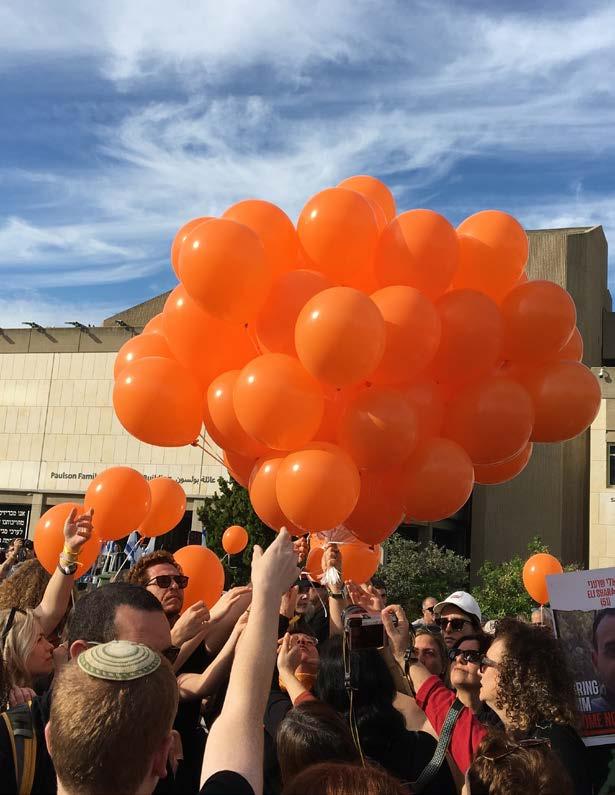
FROM JERUSALEM



WHY SUPPORT ISRAEL?
(PAGE 6)



International Christian Embassy Jerusalem
The International Christian Embassy Jerusalem was established in1980 in recognition of the biblical significance of all of Jerusalem and its unique connection to the Jewish people. Today the ICEJ represents millions of Christians, churches, and denominations to the nation and people of Israel. We recognize in the restoration of Israel the faithfulness of God to keep His ancient covenant with the Jewish people. Our main objectives are:
• To stand with Israel in support and friendship
• To equip and teach the worldwide church regarding God’s purposes with Israel and the nations of the Middle East
• To be an active voice of reconciliation between Jews, Christians, and Arabs, and to support the churches and congregations in the Holy Land
From its head offices in Jerusalem, the ICEJ reaches out into more than 170 countries worldwide, with branch offices in over 90 nations.
Our vision is:
• To reach every segment of Israel’s society with a Christian testimony of comfort and love
• To reach and actively represent to Israel the support of denominations, churches, and believers from every nation on Earth
The Christian Embassy is a non-denominational faith-based ministry supported by the voluntary contributions of our partners and friends across the globe. We invite you to join with us as we minister to Israel and the Jewish people worldwide by donating to the ongoing work and witness of the ICEJ.
Dear Friends,

The bodies of the Bibas family—Ariel (4) and Kfir (9 months) and their mother, Shiri—along with another slain hostage were released to the Red Cross and transferred to Israel as part of the ceasefire deal that took effect on January 19, 2025.
Throughout the funeral procession, masses of Israelis lined the streets to pay respects to the Bibas family and support the boys’ father, Yarden, who was released mere days before from 484 days of horror in Hamas captivity and unaware whether his family was dead or alive. Pictures of the two red-headed babies and their mother had become a symbol of the struggle to return all the hostages abducted a year and a half ago, and their story has left all of Israel in a state of profound grief.
This edition of Word From Jerusalem includes an article about this family, and though their story is tragic, it will leave you encouraged: God is still on the throne, and his eyes are always on Israel (Psalm 121:4). I encourage you to read it.
Amid such anguish, the people of Israel remain resilient and are collectively working toward rebuilding their lives and healing the unimaginable trauma they have experienced. And the ICEJ is right beside them to help, committed to fulfilling God’s mandate to comfort His people Israel, as commanded through Isaiah (40:1). You’ll read several examples of how in this month’s magazine.
And despite the worldwide antisemitism that has continued to swell since October 7, 2023, the ICEJ is gearing up for a banner year in Aliyah—the incredible modern-day return of the Jewish exiles to their ancestral homeland in Israel. I encourage you to read ICEJ Aliyah Director Howard Flower’s beautiful article on the invisible hand behind this immigration surge, a fulfillment of prophecy happening before our very eyes.
ICEJ President Dr. Juergen Buehler
USA President Susan Michael
VP International Affairs Dr. Mojmir Kallus
VP Finance David van der Walt
VP Operations Barry R. Denison
Senior VP & International Spokesman David Parsons
VP AID & Aliyah Nicole Yoder
Managing Editor/Publications Director Laurina Driesse
USA Managing Editor Karen Engle
Staff Writer Anastasiya Gooding
Graphic Design/Illustrators Ryan Tsuen, Nancy Schimp
Photography Adobe Stock, Adobe Firefly, Shutterstock, AP, Flash90, JAFI, Dorron Kline-Telfed, iStock, JAFI, Annie Splatt on UnSplash, Operation Lifeshield,Wikimedia, Wordpress, Teresa Craig, ICEJ Staff and Branches
The New King James Bible is used for all Bible references unless otherwise noted.
Word From Jerusalem is published by the International Christian Embassy Jerusalem. Reproduction in whole or in part without written permission is prohibited. Word From Jerusalem has no subscription price and is supported through contributions worldwide. The ICEJ USA Branch is a 501(c)(3) non-profit organization with offices in Tennessee, Florida, and Washington, DC. All gifts to this ministry are tax-deductible according to United States law.
Finally, our daily Global Prayer Gatherings continue to be times of worship, refreshment, and deep teaching. Join us every day at 9:30 a.m. (ET) or when you can at: www.icejusa.org/globalprayer
Many blessings from Jerusalem,

David R. Parsons
Senior
Vice President
& Spokesman International Christian Embassy Jerusalem
COVER PHOTO: Pictures taken at Hostages and Missing [Persons] Square, Tel Aviv art museum plaza (photo credit: Yossipik – own work, CC BY-SA 4.0, https://commons. wikimedia.org/w/index.php?curid=142087087)
FOR MAGAZINE ARCHIVES
visit www.icejusa.org/wfj



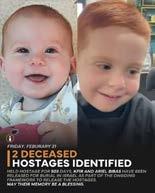
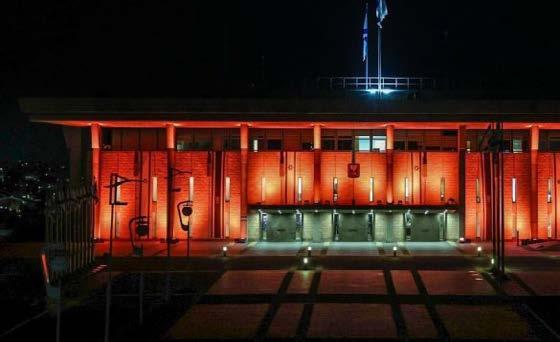

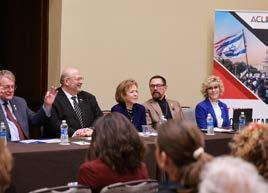



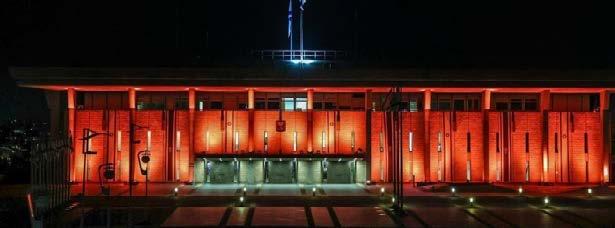
BY ICEJ PUBLICATIONS ASSISTANT MARELINKE VAN DER RIET



“ Your brother’s blood cries out to me from the ground.” (Genesis 4:10)
This striking message from Genesis 4:10 was inscribed on the casket of Shiri (32), Ariel (4), and Kfir (9 months), who were laid to rest together in an eternal embrace in late February. They were buried beside Shiri’s parents, who were tragically killed on October 7, 2023.
Ariel and Kfir’s heartbreaking story began when they, along with their mother, Shiri, were cruelly kidnapped by Hamas on October 7. The two red-headed boys quickly became among the most prominent faces of the hostages abducted that day. Kfir, just 9 months old, was the youngest of them. As part of the ceasefire deal that took effect on January 19, 2025, the bodies of the Bibas family and another slain hostage, peace activist Oded Lifshitz (83), were released
to the Red Cross and transferred to Israel on February 20, 2025. This followed a horrifying and humiliating ceremony conducted by Hamas, who proudly paraded the coffins on a newly built stage in Gaza with a backdrop of Israeli leader Benjamin Netanyahu depicted with fangs and dripping blood—a classic antisemitic motif.
After Israeli bomb experts confirmed that the coffins were not rigged with explosives (and discovered that the keys to the coffins did not work), forensic analysis made matters worse by revealing that the body inside one of the coffins was not Shiri’s but that of an unidentified Gazan woman. Shiri’s body was returned the following night.
Interestingly, no pro-Palestinian figures have raised questions about the identity of the mystery woman from Gaza. But that seems to align with Hamas’ complete disregard for human life.
As if the day could not get any worse, bombs were discovered on five buses in the Tel Aviv area that evening. Miraculously, by God’s divine intervention, the timers had been set for 9:00 p.m. instead of 9:00 a.m., sparing thousands of lives. It was as though God knew the nation needed a helping hand that day, and it served as another reminder that “He who watches over Israel never slumbers or sleeps” (Psalm 121:4).
For 16 months, Israelis held out hope for the safe return of the Bibas babies and


their mother, even after Hamas claimed in November 2023 that they had died in an Israeli airstrike. However, forensic investigations confirmed that the two boys were killed by Hamas in November 2023—not in an airstrike but by Hamas terrorists who brutally murdered them with their bare hands. They then mutilated the bodies to cover up the crime.
This time, the narrative could not be twisted. The horrors of Hamas were laid bare for the world to see, sparking global outrage. The New York Post accurately reported the story under the headline: “MONSTERS: Lying Hamas Murdered Israeli Hostage Babies with Bare Hands.”
Javier Milei, the president of Argentina and an avid supporter of Israel, called for two national days of mourning in honor of the Bibas family after their bodies were returned. They are even discussing changing the name “Palestine Street” in Buenos Aires to “Bibas Street,” as the brothers held dual Israeli Argentinian citizenship through their father, Yarden Bibas.
As the world grappled with this heartbreaking reality, solidarity poured in from across the globe. Landmarks, buildings, and monuments were illuminated in orange in countries from the United States to Germany, France, Hungary, Spain, Italy, Brazil, and Argentina. The iconic Empire State Building in New York, Niagara Falls in Canada, and the Eiffel Tower in Paris all glowed in orange as a tribute to the Bibas family. Thousands gathered in Paris, releasing orange balloons into the night sky. In Israel, on the eve of the funeral, David’s Harp Bridge, the Knesset, and Ben Gurion Airport were also lit up in orange.
The world was awash in orange, a color that transcended borders, embodying a universal cry for justice. Each flicker of light, whether on a building or floating in the sky, echoed a shared sense of loss and unwavering support for the Bibas family—a collective moment of defiance against the forces of hatred.
On the morning of February 26, 2025, the funeral procession began in Rishon LeZion and ended at the cemetery near Kibbutz Nir Oz, the family’s home. The streets were lined with thousands of mourners paying their respects, overflowing with Israeli flags, orange shirts, balloons, and other tributes. The nation lamented as if it were their own family.
The front page of Israel Hayom, one of Israel’s leading newspapers, read on the day of the funeral: “Shiri, Ariel, and Kfir: An entire nation says goodbye to you in tears. Rest in peace.”
After 510 days—from the day they were taken until they were laid to rest—the Bibas family was finally buried in a private ceremony attended only by family and close friends. At the family’s request, no government representatives were present. The eulogies were broadcast live.
Yarden Bibas, Shiri’s husband, who had been kidnapped separately and held hostage in Gaza for 484 days before his release on February 1, 2025, eulogized his wife and children. Wearing an orange kippah, he said, “I’m sorry I couldn’t protect you all.”
The people of Israel have rallied around Yarden, seeking to ease his burden. Despite his immense sorrow, his strength is
undeniable. It was recently revealed that while in captivity, Yarden was offered better treatment if he agreed to convert to Islam. He responded, “I was born a Jew. I will die a Jew.” They proceeded to withhold him food for two days.
Shiri’s sister, Dana, also spoke at the funeral, saying of Hamas: “They will not defeat us; they will not break us. . . . On the contrary, their [Hamas’] mission failed because we united, because we grew stronger,” exemplifying the Jewish spirit of survival and resilience.
In honor of Shiri, Ariel, and Kfir, Yarden completed a Sefer Torah by writing the last three letters. The Torah scroll, which features a custom-made orange covering adorned with a picture of Shiri embracing her two sons, will be housed at Kibbutz Nir Oz—the place where the boys’ lives began and where they now rest forever.
Ariel, which means “lion,” and Kfir, which means “cub,” have become symbols of innocence stolen. Yet amid the devastation and loss, there is a profound truth: the Lion of Judah is watching over Israel, and He is watching over us. He sees the injustice and the pain. He is not indifferent to suffering. As God says in Deuteronomy 32:35, “Vengeance is Mine,” and He will repay (see also Romans 12:19). The weight of retribution belongs to God alone, and He will make all things right in His time.
May the story of these two red-headed cubs ignite an eternal flame in our hearts and serve as a powerful reminder, echoing through generations:
NEVER AGAIN!


BY ICEJ SENIOR VICE PRESIDENT AND SENIOR SPOKESMAN DAVID PARSONS
This article is adapted from a video on Christian Zionism in the ICEJ Webinar Series presented by David Parsons, ICEJ Senior Vice President & Spokesman
Jerusalem
Post-October 7, many want to know why Christians are still supporting Israel amid the vile accusations and antisemitism against the Jewish State and people. Many are searching the web about “Christian Zionism.” Here I’ll discuss Israel’s enduring biblical significance and particularly the calling of Israel starting with Abraham.
Theological Basis for Christian Support for Israel
The core question is: What does this divine calling mean, and what is its relevance today? The Bible speaks often about God’s calling upon Abraham and his descendants, particularly through Isaac, Jacob, and the tribes of Israel. This discussion aims to establish the theological basis for Christian support for Israel, grounded in the Bible rather than political or cultural reasons.
The concept of whether God called Israel into a special relationship or discarded them after their failures is central to this exploration. The key issue lies in understanding God’s nature—whether He remains faithful to Israel, even today, or whether Israel was abandoned after the birth of the church and Christ’s resurrection. Replacement Theology, which prevailed for 1,400 to 1,500 years, suggests that after Christ’s resurrection, God’s attention shifted solely to the church, effectively replacing Israel in God’s redemptive plan. This theology often carried a hostile edge, accusing Jews of Christ’s death and condemning them to perpetual exile.
Amillennialism, another view, suggests that Christ will never return, leaving no role for Israel. Postmillennialism holds that Christ returns after the church reigns for a thousand years and perfects the world. Dispensationalism, on the other hand, posits that after the church is raptured, God’s attention will return to Israel during the seven-year tribulation, with Israel playing a crucial role in the completion of God’s plan. However, it often becomes obsessed with the dark side of prophecy, involving the death of two-thirds of Jews during the great Tribulation. This view has been tempered by some followers in recent years alongside the rise of Messianic Judaism and, thus, is called “Progressive Dispensationalism.”
The alternative approach is Biblical Zionism, which views the covenants God made with Israel as still relevant. This approach emphasizes that God promised the land of Israel to Abraham and his descendants as an everlasting possession in a covenant that offers redemption to the whole world, not just Israel. The Jewish return to Israel today is seen as the fulfillment of these divine promises to Abraham—especially the land promise—and it is supported by both the Hebrew prophets and the New Testament. Israel’s return is expected to complete God’s redemptive plan, especially through the Davidic covenant.
Biblical Zionism affirms that God, through divine covenant, bequeathed Israel’s land to Abraham’s descendants as an eternal possession. The covenant is characterized by God’s oath, promising that Israel would have a unique role in world redemption. Even today, the Jewish people’s return to the land signifies God’s faithfulness to these promises. This view also connects with the Christian understanding of salvation through the Jewish people, particularly in the person of Jesus.
The concept of Israel’s “blessing” comes from Genesis 12:3:
I will bless those who bless you, and I will curse him who curses you; and in you all the families of the earth shall be blessed.
God makes a promise through Abraham to bless those who bless Israel and to curse those who curse them. But the most important aspect is the final phrase: “In you all the families of the earth shall be blessed.” In Galatians 3, Paul explains that this promise
reflects the gospel first being preached to Abraham, affirming that the salvation offered to all through Christ stems from Israel. The blessing of Abraham, a blood covering for sin, is obtained by faith—specifically through Christ’s sacrifice on the cross.
Christians are encouraged to support Israel because of the redemptive blessings they have received through the Jewish people. This includes not only spiritual blessings but also a material obligation to support Israel. Romans 15 highlights that gentiles who have received spiritual benefits from Israel have a duty to minister to Israel in material ways.
Biblical Zionism recognizes Israel as both a people and a land chosen by God for world redemption. The Jewish people, through their history and return to the land, have been central to God’s plan of salvation. The ultimate fulfillment of God’s promises will be seen in the messianic age, when Christ’s reign brings peace and righteousness to all the earth. Christians must acknowledge that God has not discarded Israel but continues to work through both Israel and the church to accomplish His redemptive purposes.
The question for Christians today is whether God has fulfilled all His promises to Israel. While some believe that God’s promises were fully realized in the first century, Biblical Zionism holds that God’s purposes for Israel are ongoing. Christians must bless Israel, recognizing its enduring role in God’s plan for redemption. Criticizing Israel unfairly or holding double standards can be seen as antisemitic and goes against the biblical call to respect and stand with God’s chosen



BY KAREN ENGLE, ICEJ USA MANAGING EDITOR
imeon is only referenced a few times in the Bible, yet those passages are packed with insight. In the scene that follows in Luke 2, Jesus was eight days old, and Joseph and Mary were at the temple to dedicate Him to the Lord and have Him circumcised, as required by God’s law, when they encountered Simeon. Luke writes:
Behold, there was a man in Jerusalem whose name was Simeon, and this man was just and devout, waiting for the Consolation of Israel, and the Holy Spirit was upon him. And it had been revealed to him by the Holy Spirit that he would not see death before he had seen the Lord’s Christ. (25–26)
This passage says Simeon was “just and devout,” meaning his heart was tender toward God. It also tells us Simeon had spent his life watching and waiting for the “Consolation of Israel,” what pastor, theologian, and author Steven Cole says “refers to the time prophesied by Isaiah (40:1–2) when God would comfort His people and remove their sins by sending His Anointed One, the Messiah.”
At that time (first-century Israel), the faith of Abraham was spoiled by the man-made doctrines of the Pharisees and Sadducees, whom Jesus, citing Isaiah, would later condemn in Mark 7:6:
These people honor me with their lips, but their hearts are far from me. (NIV; see also Isaiah 29:13)
These leaders appeared to say the right things, but their worship of God had become all about keeping human rules, and they were therefore far from God.
But Simeon was a layperson who was part of the believing remnant (along with Anna, Zacharias, Elizabeth, Mary, and others), those faithful few in Jesus’ day who were deeply devoted to God and not caught up in man-made traditions. They believed what God’s Word said about their coming messiah and were waiting and watching for His arrival. They had eyes of expectation.
Luke 2:27–32 tells us Simeon’s presence at the temple that day was not by chance:
So he [Simeon] came by the Spirit into the temple. And when the parents brought in the Child Jesus, to do for Him according to the custom of the law, he took Him up in his arms and blessed God and said: “Lord, now You are letting Your servant depart in peace, according to Your word; for my eyes have seen Your salvation which You have prepared before the face of all peoples, a light to bring revelation to the Gentiles, and the glory of Your people Israel.” And Joseph and His mother [Mary] marveled at those things which were spoken of Him.
Simeon was at the temple because he “came by the Spirit”—God had led him there. According to this passage, Simeon knew Israel’s messiah, whom Jeremiah called the “hope of Israel,” would also be a “light” to the gentiles. Israel’s messiah would make salvation and truth available to the whole world, not just the Jews (see Isaiah 9:2; 42:6; 49:6–9; 51:4).
Simeon knew the Hebrew Scriptures (the Old Testament) and expected a literal fulfillment of what they said about this longprophesied Redeemer. And as he stood before Mary, Joseph, and Jesus that day, Simeon was acknowledging he was in the presence of his Savior.
Amos wrote that God “does nothing without revealing his plan to his servants the prophets” (3:7 NIV), and Jesus told His disciples ahead of time about His death and resurrection “so that when it happens you will believe that I AM the Messiah” (John 13:19 NLT; see also John 14:29). Yet Jesus often condemned Jewish religious leaders for their lack of understanding, at one time chiding them for being able to interpret the weather simply by looking at the color of the clouds but being unable “to discern the signs of the times” (Matthew 16:3).
The story of Simeon seems unassuming, but we can learn much from this humble searcher of the Scriptures. Like Simeon, God has told us through the prophets of old everything He wants us to know about what’s ahead so we will recognize the season of our Messiah’s return. But also like Simeon, we must know our Bibles well, pay attention to what’s happening around us, and allow the Spirit to lead us.






BY SHELLEY NEESE, ACLI COORDINATOR
American Christian Leaders for Israel (ACLI) celebrated its tenth anniversary at the National Religious Broadcasters Convention in Dallas, Texas. Under the massive steel-framed atrium at the Gaylord Texan Resort, over 100 of ACLI’s members gathered to mark the occasion and applaud the growth of the network to over 3,000 Christian leaders representing tens of millions of Americans. NRB’s convention of nearly 6,000 attendees has become the largest annual pro-Israel Christian event in the United States.
Troy Miller, president and CEO, stated, “NRB is partnering step-in-step with ACLI on all its initiatives and activities going forward.” Troy explained that because ACLI, as a coalition, represents millions of Christians across the country, it has the power to affect change. In addition, Bishop Robert Stearns of Eagles’ Wings Ministries
and Dean Michele Bachmann of Regent University, School of Government, spoke about their own roles as members of ACLI’s Advisory Board. Dean Bachmann pointed to the Bible as the inspiration and founding charter responsible for unifying Christian voices in defense of Israel. Bishop Stearns repurposed a famous quote attributed to Israel’s first prime minister, David BenGurion, who said Golda Meir was “the only man” in his political cabinet. In recognition of ICEJ USA President and Director of ACLI Susan Michael’s quiet strength and determination in bringing the group of leaders together, Bishop Stearns likened her to “our Golda.”
Susan recalled the founding story of ACLI. On January 20, 2015, a pivotal moment unfolded in Washington DC as President Obama pursued a controversial nuclear deal with Iran. A group of 12 Christian
leaders—including the president of NRB— met to share their deep concerns over the existential threat posed by a potentially nuclear-armed Iran.
They decided to form an informal alliance called American Christian Leaders for Israel, a network of leaders similar to the “Conference of Presidents,” an umbrella organization that coordinates the activities of numerous American Jewish organizations. The idea was that an organized network could respond more quickly to threats and crises, and that a united voice of many Christian leaders truly representative of tens of millions of Christians in America would have far greater impact than any individual leader or organization.
Within weeks of ACLI’s founding, the first crisis was at the doorstep. Prime

Minister Benjamin Netanyahu took the extraordinary step of addressing the US Congress directly. ACLI was poised and ready to support Netanyahu’s position, warning the American people that the proposed deal would not prevent Iran from developing nuclear weapons but instead pave the way for it.
Since that time, ACLI has responded quickly and collaboratively to every other threat to the Jewish people or crisis facing the nation of Israel. ACLI’s advocacy efforts continued in 2016, seeking to clarify presidential candidates’ positions on Israel and ultimately helping to secure Donald Trump’s commitment to recognize Jerusalem as Israel’s capital. In the wake of Hamas’ brutal attack on October 7, 2023, ACLI took swift action by issuing letters to President Biden and the SecretaryGeneral of the United Nations. They also addressed over 300 university presidents, urging them to combat antisemitism on campus and enhance security measures for Jewish students.
ACLI is a collaborative platform that brings Christian leaders together, so they have a louder impact as one. “No single voice is loud enough to speak on behalf of 70 million Christians in America,” said Susan, “but when we unite, we can represent the voice of millions, speaking to them and for them.”
The success and impact of ACLI over the past decade can be attributed to its
dedicated Advisory Board. Key members of this esteemed board include Gary Bauer, president of American Values; Gordon Robertson, president of the Christian Broadcasting Network; Joel Rosenberg, founder of All Israel News; Johnnie Moore, president of JDA Worldwide; and Sammy Rodriguez of the National Hispanic Christian Leadership Conference. Their collective wisdom and commitment have been instrumental in guiding ACLI’s initiatives and strengthening its voice.
Prior to the NRB, President Trump said he would articulate America’s position on Judea and Samaria in a matter of weeks. Dr. Susan Michael said, “We are at a moment in history where there is a conversation taking place in Washington, DC, about Judea and Samaria, and we can speak to its significance as Israel’s biblical heartland.”
ACLI put together a resolution outlining the biblical history of Judea and Samaria. The resolution calls for the American government to refrain from pressuring Israel to relinquish its biblical heartland. This milestone event not only celebrated ACLI’s decade-long commitment to supporting Israel but also demonstrated the organization’s ongoing influence and readiness to address critical issues affecting US-Israel relations. With each passing year, ACLI aims to strengthen its impact, unite more Christian voices, and further its mission of unwavering support for the Jewish State.





Members of Foundations Church in Williamsburg, VA, under the guidance of Pastors Michael and Bonni Hines, on an ICEJ tour to Israel— walking where Jesus walked and seeing the Bible come to life.



Join an ICEJ tour to Israel and experience sights and insights that will revolutionize your understanding of the Scriptures and your walk with the Lord! We have several upcoming tours, including:
ARISE YOUNG ADULTS SUMMER TOUR
July 20 – 28
Learn more at: www. arisegeneration.org
THE 2025 FEAST OF TABERNACLES
October 6–13
L earn more at: www.icejusa.org/feast-tour
HANDS-ON SERVING TOUR
November 4–13
L earn more at: www.icejusa.org/servingtour
ISRAEL EXPERIENCE TOURS
Partner with the ICEJ to bring your church or ministry to Israel! We offer full-service tour coordination—from start to finish, we work with you to customize the perfect tour to meet your unique needs and connect you and your group to the land of the Bible.
Learn more at: www.icejusa.org/church-tours
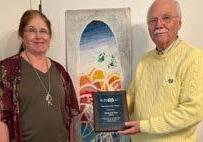
Dave and Celia Burns made their first trip to Israel in the 1960s and have been advocates for Israel ever since. The ICEJ recognizes them as Watchman of Zion partners for their dedication and generous support. With hearts as big as their home state of Indiana, Dave and Celia boldly share about the importance of Israel’s role in the world, past, present, and future. ICEJ is blessed to have them as members of our community!

This International Christian Embassy Jerusalem’s USA Branch hosted a special pastors and leaders gathering last month at First Baptist Church in Morristown, TN. At the event, ICEJ staff—including Outreach Director Dr. Tyson Lambertson, Tours and Outreach Manager Kelsey Olguin, and Church Relations Coordinator John Vedder—provided valuable insights into Israel’s biblical significance, underscored the urgent need to stand with Israel in this critical hour, and introduced participants to ICEJ’s resources and opportunities for partnership. Those who attended left with a deeper understanding of why Israel matters for Christians today.
Pastor Dean Haun, whose church hosted the event, said: “We were privileged to host the ICEJ pastors’ luncheon at our church. The response was fantastic. The ICEJ team, led by Dr. Tyson Lambertson, did a fantastic job explaining why Israel matters and the role of the ICEJ among the Christian community.” Please contact us at info@icejusa.org if you would like to host a pastors gathering in your community.


Karen Engle, our Managing Editor, oversees much of the content produced by ICEJ USA, including the monthly Word From Jerusalem magazine and Embassy Publishers books. In addition, she contributes to the production of ICEJ U educational courses and writes articles for both the magazine and the blog. Karen is passionate about leveraging the written word to educate and equip others regarding God’s purpose and plan for Israel and the nations.
Her love for Israel began more than 15 years ago through a study of the Feasts of the Lord. As she learned about the seven feasts, including Passover, the Day of Atonement, and Sukkot , the Lord guided her on a path of study that deepened her understanding of Israel’s role in God’s story. This journey led to a trip to Israel in 2014 that profoundly changed her life. Since then, she has taken several groups to Israel and teaches whenever asked about Israel’s significance in God’s redemption plan.
“That first trip to Israel forever changed me,” Karen says. “I went by myself and had no idea what I was doing. I had three contacts—a friend’s mom in Kfar Sava, north of Tel Aviv, my original Hebrew teacher from California who had moved back to Israel, and friends who were missionaries in Nazareth. They each housed me and toured me all over the land. And at each site, as I merged what I saw with what Scripture said, it was as if my Bible went from black and white to technicolor.”
Shortly thereafter, she connected with ICEJ USA President Dr. Susan Michael and started editing the Word From Jerusalem and other content until coming on full-time with ICEJ almost three years ago.
“Israel is significant to me because its existence demonstrates that God is real and faithful to His Word,” says Karen. “This small nation, made up of an unassuming people group that has faced unimaginable persecution throughout history, serves as the vessel God is using for the redemption of the world. However, most Christians are unaware of this, and my heart’s desire is to help change that.”
Before the ICEJ, Karen worked in marketing at Logos Bible Software as their senior editor. She has been a copyeditor of Christian academic nonfiction for more than 25 years—including for several traditional book publishers—but started her career as a high school English teacher.
In her free time, she loves to read, run, hike, and spend time with her two grandsons. She and her husband live in northern Washington State.



BY ICEJ AID ADMINISTRATOR NATIVIA SAMUELSEN
On October 7, 2023, a miraculous event unfolded at Kibbutz Ein HaShlosha. Shiri Aviv, a member of the kibbutz board, explained: “75 terrorists entered the kibbutz fields but were left exposed because farmers had just harvested the grain a few days before. A helicopter saw them and neutralized them, preventing further ambushes. If those terrorists had entered the kibbutz, most of the community would not be here today.”
However, despite this intervention, four people from the kibbutz were tragically murdered, and approximately 16 houses were burned down. Some homes were riddled with bullet holes, while others sustained damage from rocket fire in the following days. Because the community is located right on the border with Gaza, it was especially vulnerable, and looting followed the devastation.
The International Christian Embassy Jerusalem (ICEJ) is honored to support this community, which, after spending several months living in hotels in Eilat, was relocated to Netivot in the fall of 2024 until they can move back to Ein HaShlosha. During a recent trip to Netivot, an ICEJ team visited the displaced Ein HaShlosha community to deliver special gift packages for the Tu B’Shvat holiday.
ICEJ Vice President for AID and Aliyah Nicole Yoder said: “These gifts are an expression of love to let the people know that they are remembered in these challenging times. Each comes with a gift card and a blessing to let them know that they are not alone. Over the past year, we’ve been able to give over 1,000 gift packages to families in various evacuated kibbutzim, including Nir Oz,
Re’im, Be’eri, Kfar Aza, Nachal Oz, and Ein HaShlosha, due to the generosity of Christians in Singapore.”
While in Netivot, in addition to Shiri—who is the acting community coordinator—we met Yael Sherby-Hurwitz, another team member helping the kibbutz recover. Yael shared that 92 percent of the community is living in the temporary neighborhood: “The kibbutz community is strong, and living together restores a small sense of normality, despite the transition from a rural environment to a larger city.”
With the community together, they have been able to reestablish routines and create group and individual therapeutic activities so that healing can happen individually and collectively. A favorite has been art therapy, which has become so popular that the kibbutz is considering opening a dedicated art therapy house once community members return home. These creative outlets support them in processing their trauma.
As the time to return to the kibbutz draws closer, new challenges arise. Shiri shared that many families have grown accustomed to the sense of safety as well as the conveniences of city life in Netivot. The kibbutz board, alongside the government, is actively working to support their transition back home in the coming months. Shiri said there are many arrangements to be made like setting up more streetlights: “At first, you might think it’s not urgent, but for them, many children since October 7 are afraid of the dark and, therefore, don’t go out at night. So, accommodating these needs is a major priority.”
Yael expressed the community’s appreciation in a letter to the ICEJ : “On behalf of the members of Kibbutz Ein HaShlosha, I want to extend our deepest gratitude for the wonderful gift boxes you personally delivered to our community members. The people of Ein HaShlosha, who have experienced so much trauma, have not yet been able to return home since the October 7 massacre. However, your kindness and generosity have brought warmth and comfort to them, and we are truly touched by your support.”
Shiri’s survival story on October 7 is extraordinary. For 36 agonizing hours, she hid with her children as terrorists roamed outside her home. Then, by a miracle, the terrorists suddenly left. When help
finally came, she did not pause to grieve or crumble—she simply washed her face and has been leading the community support and resilience efforts ever since, using her strength and courage to bring hope and healing to the community.
She continued, “Gestures like yours remind us that even in the face of hardship, we are surrounded by compassion and solidarity. Your generosity has made a real difference, and we are thankful to have you standing with us.”
As Ein HaShlosha residents prepare to return home, their story of bravery continues to shine through. The ICEJ is privileged to stand alongside this community and is committed to helping Israelis in need during these challenging times.
BY ICEJ PUBLICATIONS ASSISTANT MARELINKE VAN DER RIET
During our recent Envision pastors conference in Jerusalem, delegates visited the Eshkol and Sha’ar HaNegev regions in southern Israel, where they could still see evidence of the devastation left behind by the October 7 massacres. Yet they also heard stories of resiliance, hope, and determination to rebuild and move forward. One such story stood out.
Orit is a native of Kfar Aza who recounted for the pastors her once peaceful life on the kibbutz and her dreams of living harmoniously with her nearby neighbors in Gaza. But on that dark day 16 months ago, her dream was shattered.
“We saw things our own eyes could not believe,” Orit shared, noting that 64 members of Kfar Aza were killed and 19 more taken hostage during the October 7 pogrom.
In what she described as “divine intervention,” Orit had spent the night before in Tel Aviv due to a strange sense of looming danger. Thankfully, her four children were also not at home that night. However, her former husband, Omer, was still on the kibbutz and was killed on his way to open the room where the regional council’s guns were stored. It would be 30 hours before Orit received the devastating news of his death.
“Why did this happen to us? Because we are Jewish. We were naive; we thought we could live by the fence,” said Orit. “People used to ask me, ‘How [can] you live like this?’ I would say, ‘This

is temporary. One day we will be able to talk to the Gazan people. It’s their government who are terrorists, not them.’ But on October 7, we woke up to a different reality. For two weeks after October 7, I went to eight funerals a day. I knew everyone and wanted to honor them all.” Orit lamented, “We cannot continue our healing while there are still hostages in Gaza.”
Yet amid her lingering grief, Orit is upbeat about the future.
“We will not let them win,” she resolved. “I want to live well and go back to my home in Kfar Aza. We want to rebuild our life. I want my grandchildren to be raised like I was. We must rebuild, even more beautifully than before.
“I see people like you, and you give me hope that most people in the world are good, unlike those who came on October 7 and killed my family and friends,” she told the Envision pastors.
Today, Orit is living in temporary housing at Kibbutz Ruhama, which has been set up for evacuated residents of Kfar Aza until they can finally go home in a year or more. Until then, they are sticking together as a tight community to gain strength and comfort from each other.
The ICEJ is helping to rebuild community buildings in Kfar Aza and other hard-hit Israeli farming villages near the Gaza border.

Orit speaks to pastors at the 2025 Envision conference in February.


BY HOWARD FLOWER, ICEJ ALIYAH DIRECTOR

The International Christian Embassy Jerusalem is gearing up for a banner year in Aliyah—the incredible modern-day return of the Jewish exiles to their ancestral homeland in Israel. Our efforts will intensify in the coming weeks, as the ICEJ will be sponsoring flights for 154 Jewish immigrants from France, 100 from Russian-speaking countries, and 26 from Ethiopia.
Last year, the ICEJ- assisted 3,653 Jews in their Aliyah and integration process in Israel, which was 11.3 percent of the total immigration figures for 2024. That brings the cumulative total to 188,977 Jews we have assisted with Aliyah since the Christian Embassy's founding in 1980.
Despite the current war, the Jewish Agency for Israel (JAFI) has set a goal of bringing 300,000 Jews home to Israel over the next five years. The Christian Embassy will be working alongside JAFI, and we hope to increase our share of the overall Aliyah figures. But we need your help in carrying out this prophetic vision of the great ingathering the Jewish people from around the world in our day.
Zechariah and the Return of the Exiles
Our Feast theme from last October, “Not by might, not by power, but by My Spirit,” taken from Zechariah 4:6, resonates well with the current wave of Jewish immigration to Israel and reminds us of God’s hand behind the ongoing Jewish return to Eretz Israel—the Land of Israel.
The Hebrew prophet Zechariah played a major role in encouraging the Jewish people during their return from Babylonian exile in the sixth
Michael Utterback carries a Jewish woman during the ICEJ assisted “Exobus” project, where more than 35,000 Jewish immigrants arrived to Israel in the 1990s.

century BC. Zechariah’s prophecies, rich in apocalyptic visions and messianic overtones, offered hope and assurance of divine fidelity to His covenant with Israel. His prophetic words and visions were relevant in the postexilic period, and they are relevant today as Israel has been restored as a nation, and their messianic expectations are rising.
The Invisible Hand behind Aliyah
The Jewish people’s return to their homeland is not so much a result of human effort or political maneuvering as a divine work orchestrated by God. This supernatural dimension of Aliyah is often overlooked in secular discussions, but it remains central to understanding the clear prophetic significance of Israel’s rebirth today.
Even in Zechariah’s time, the Jewish return from Babylon was attributed to divine intervention. God touched the hearts of Persian kings, particularly Cyrus, to allow and even encourage the Jews to return to their homeland.
Last year, the ICEJ assisted 3,653 Jews in their Aliyah and integration process in Israel, which was 11.3 percent of the total immigration figures for 2024.


We can only understand such historic events when we view them through a spiritual lens.
The period following the rebuilding of the temple in Jerusalem saw a spiritual renewal and revival among the people. Zechariah 8:23 also prophesies a future time of global revival when “Ten men from every language of the nations shall grasp the sleeve of a Jewish man, saying, ‘Let us go with you, for we have heard that God is with you.’”
Even the revival following the return from Babylon was not limited to the Jewish people but had a broader impact on the surrounding nations. This foreshadowed the global impact Israel’s restoration today would have in the ultimate fulfilment of the Great Commission.
The modern-day rediscovery of the Feast of Tabernacles, which the Jewish people had largely neglected for centuries, has become

example of a sukkah (or “booth”) seen annually during the Feast of Tabernacles
a key aspect of this renewal. Nehemiah 8:17 records that the entire assembly of those who had returned from exile celebrated the Feast of Sukkot or “Booths,” noting that it had not been observed in this manner since the days of Joshua. This return to biblical observance symbolized Israel’s spiritual recommitment to their divine covenant with God.
Thus, the biblical theme “By My Spirit” takes on added significance in the context of modern Aliyah. The establishment of the State of Israel in 1948 and the subsequent waves of Jewish immigration from around the world have often been viewed through the lens of political and military achievements. Yet behind these visible efforts lies an invisible hand working to fulfill ancient biblical prophecies.
Therefore, the Hebrew commentaries on Zechariah emphasize that the prophet’s visions extend far beyond his immediate context, pointing to a future time when Jews would be gathered from the four corners of the earth. This global ingathering, according to Zechariah 10:8–10, would be so extensive that there would not be enough room for all the returnees. This prophecy clearly reflects the modern Aliyah, which has seen millions of Jews return to Israel from diverse countries and cultures.
The spiritual aspect of the modern-day Aliyah is vitally important. It involves not only the physical return of Jews to Israel but also a spiritual awakening among the Jewish people. Zechariah 12:10 speaks of a time when God will “pour on the house of David and on the inhabitants of Jerusalem the Spirit of grace and supplication.” This spiritual revival is seen as an integral aspect of Israel’s restoration, pointing to a deeper purpose beyond their mere geographical relocation.
There has undoubtedly been a supernatural side to Israel’s preservation and restoration over the millennia. Despite centuries of persecution, dispersion, and attempts at annihilation, the Jewish people have maintained their identity and their connection to the Land of Israel. This survival and eventual return defy natural explanations and are nothing less than the fulfillment of divine promises.
Both Jews and Christians must recognize this amazing restoration as an ongoing work, which requires continued reliance on its underlying spiritual dynamic. This calls for humility and dependence on God’s power to complete His work not only in Israel but also out among the nations.
We have seen that Zechariah directly connects the current return of Jews to Israel with previous returns and revivals, helping us see that it is all part of a divine plan playing out through history. As we witness the ongoing fulfillment of biblical prophecies in contemporary times, we are encouraged to look beyond the visible aspects of Israel’s restoration to recognize the unseen spiritual forces bringing about God’s redemptive purposes for the Jewish people and, by extension, all nations.
This requires that we pray for the continuing return of the Jewish exiles to the Land of Israel—and for what we can do individually to help bring it about in the natural, as God faithfully works to bring about His ultimate spiritual purposes through Israel and dedicated Christians worldwide.

By Guest Writer Arthur A. Flower
The Gaza Strip, a narrow piece of land along the Mediterranean Sea, has been a place of conflict, culture, and geopolitics for millennia. Its history is intertwined with the broader narrative of the Middle East, reflecting the rise and fall of empires, the clash of religions, and the struggle for self-determination.
Gaza’s history dates back over 3,000 years, making it one of the oldest continuously inhabited areas in the world. Located at the crossroads of Africa and Asia, Gaza was a strategic hub for trade and military campaigns. The ancient Egyptians, Philistines, Assyrians, Babylonians, Persians, and Greeks all vied for control of this fertile coastal region. Gaza is mentioned in the Hebrew Bible as one of the five cities of the Philistine Pentapolis, and it played a significant role in the conflicts between the Israelites and the Philistines.
During the Hellenistic period, Gaza became a prominent city under Alexander the Great and later the Ptolemaic and Seleucid empires. The Romans conquered Gaza in 63 BC, and it flourished as a center of commerce and culture. With the rise of Christianity, Gaza became an important religious site, and during the Byzantine era, it was home to a vibrant Christian community.
The Islamic conquest of the seventh century AD brought the city of Gaza under Muslim rule, and it became part of the Umayyad and Abbasid Caliphates. Over the centuries, Gaza was ruled by various Islamic dynasties, including the Fatimids, Ayyubids, and Mamluks, who gradually expanded control beyond the city. The Ottoman Empire captured Gaza in 1516,
and it remained under Ottoman control for four centuries until the end of World War I.
After World War I, the League of Nations granted Britain the mandate to administer the region known as Palestine, which included modern-day Israel, Judea and Samaria (the “West Bank”), the Gaza Strip, and the Kingdom of Jordan. The mandate was established to facilitate the creation of a “national home for the Jewish people” while maintaining the rights of the existing Arab population. Gaza and the surrounding area, with its predominantly Arab population, was included in the mandate as part of the broader territory of Palestine. In 1922 the British ceded 78 percent of Palestine to create the Arab state, Transjordan, which is today the Hashemite Kingdom of Jordan.
The British Mandate period (1920–1948) was marked by growing tensions between Jewish and Arab communities in what remained of Palestine. Jewish immigration increased significantly, driven by the Zionist movement and the rise of antisemitism in Europe. Arab immigration grew at about the same rate due to economic opportunities produced by growing Jewish communities. Arab leaders opposed Jewish immigration and the establishment of a Jewish state, leading to violent clashes and uprisings.
In 1947 the United Nations proposed a partition plan to divide Palestine into separate Jewish and Arab states, with Jerusalem under international administration. The Jewish leadership accepted the plan, but the Arab states and Palestinian leaders rejected it. On May 14, 1948, Israel declared its independence,
prompting an invasion by neighboring Arab states, including Egypt, Jordan, Syria, and Iraq.
During the 1948 Arab Israeli War (known in Israel as the War of Independence), Egypt occupied Gaza and the surrounding area. The war ended in 1949 with a series of armistice agreements between Israel and its Arab neighbors. The Egyptian Israeli Armistice Agreement established the Gaza Strip as a distinct territory under Egyptian military administration. However, Egypt did not annex Gaza or grant its residents Egyptian citizenship, leaving the territory in a state of legal limbo.
In June 1967 Israel preemptively struck against Egypt, Syria, and Jordan in response to escalating tensions and the mobilization of Arab forces. During the SixDay War, Israel captured the Gaza Strip, the Sinai Peninsula, Judea and Samaria, East Jerusalem, and the Golan Heights. Gaza came under Israeli military administration, and Israel began building settlements in the territory.
The 1973 Yom Kippur War, launched by Egypt and Syria to regain lost territories, ended in a stalemate. The subsequent Camp David Accords (1978) and the EgyptIsrael Peace Treaty (1979) led to Israel’s withdrawal from the Sinai Peninsula but left the status of Gaza unresolved. Egypt renounced its claims to Gaza, effectively leaving it under Israeli control.
The Oslo Peace accords failed to produce fruitful negotiations between Israel and
the Palestinian leaders regarding borders and future governance of Gaza. Therefore, in 2005 Israel unilaterally withdrew from Gaza creating defacto borders. Within two years the Palestinian Authority government in Gaza fell to Hamas. Over the next 18 years, Hamas personally pocketed billions of dollars while also spending billions on building an underground military complex designed to be a staging ground for the destruction of Israel. The extent of the underground tunnels was only discovered once Israel entered Gaza after the bloody massacre of October 7, 2023.
President Trump’s recognition of Israeli sovereignty over the Gaza Strip would be a significant step toward resolving the territory’s legal and political status. Such a move would affirm Israel's right to oversee the rebuilding of Gaza and prosecute terrorists, ensuring stability and security in the region.
1. Historical and Legal Basis:
Israel’s control of Gaza since 1967, combined with Egypt’s renunciation of its claims, provides a strong legal basis for Israeli sovereignty. The Oslo Accords (1993–1995) established the Palestinian Authority but did not grant it full sovereignty over Gaza. Israel’s withdrawal from Gaza in 2005, which led to Hamas’ takeover in 2007, created a power vacuum that has perpetuated violence and instability.
2. Rebuilding Gaza: Israeli sovereignty would enable the reconstruction of Gaza’s infrastructure, which has been devastated by years of conflict

and mismanagement. Israel has the resources and expertise to rebuild Gaza’s economy, improve living conditions, and promote coexistence.
3. Counterterrorism: Hamas, a designated terrorist organization, has used Gaza as a base for launching attacks against Israel. Israeli sovereignty would allow for the dismantling of terrorist networks and the prosecution of individuals involved in violence, ensuring the safety of both Israelis and Palestinians.
The recognition of Israeli sovereignty over Gaza would also confirm the supremacy of international law over Sharia law in the global arena. Sharia law, derived from the Quran and Hadiths, governs many aspects of life in Muslim-majority countries. However, it is not universally applicable and is often interpreted differently by Sunni and Shia Muslims.
1. International Law: The modern international legal system is based on treaties, conventions, and agreements between sovereign states. The United Nations Charter, the Geneva Conventions, and other international instruments provide a framework for resolving disputes and promoting peace. Israeli sovereignty over Gaza would be consistent with these principles, as it would establish a clear legal framework for governance and security.
2. Sharia Law: While Sharia law is binding on Muslims in matters of personal and religious conduct, it
does not override international law in matters of state sovereignty and territorial disputes. The Quran and Hadiths emphasize justice, fairness, and the fulfillment of treaties (e.g., Surah Al-Ma'idah 5:1), which align with the principles of international law.
3.Local vs. International Application: Sharia law is valid locally only by acquiescence, meaning it applies within a community that consents to its implementation. It does not have the authority to dictate international relations or override the sovereignty of states. The recognition of Israeli sovereignty over Gaza would demonstrate that international law takes precedence in matters of global governance.
Throughout history, from ancient times to the present, the Gaza Strip has been a crossroads of civilizations, religions, and empires. The inclusion of Gaza in the Palestinian Mandate, the 1948 War of Independence, and the subsequent conflicts have shaped its current legal status.
President Trump’s affirmation of Israeli sovereignty over Gaza would provide a legal and practical framework for rebuilding the territory and ensuring security. It would also reaffirm the supremacy of international law over Sharia law, demonstrating that global governance must be based on universally accepted principles rather than religious doctrines. By recognizing Israel’s sovereignty over Gaza, the international community can take a decisive step toward peace, stability, and justice in the Middle East. It would also allow Israel to rebuild Gaza with the partners it chooses.








